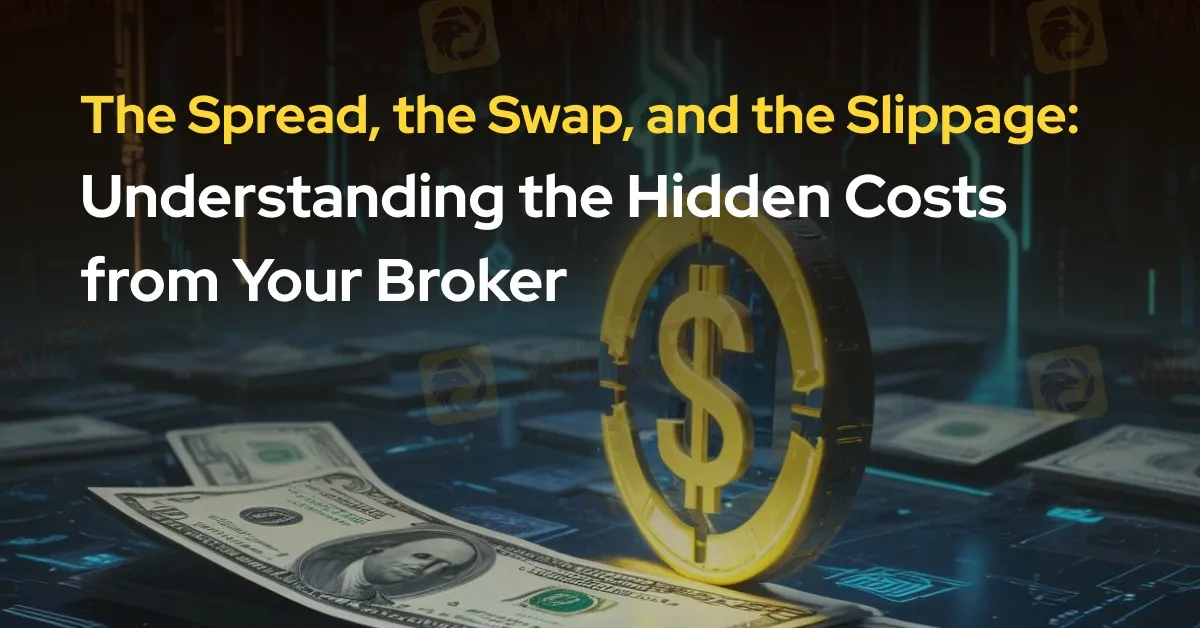简体中文
繁體中文
English
Pусский
日本語
ภาษาไทย
Tiếng Việt
Bahasa Indonesia
Español
हिन्दी
Filippiiniläinen
Français
Deutsch
Português
Türkçe
한국어
العربية
The Spread, the Swap, and the Slippage: Understanding the Hidden Costs from Your Broker
Abstract:Hidden costs like spreads, swaps, and slippage can eat away at your profits if not managed carefully. Brokers often gloss over these costs, leaving traders unaware of their true impact. Understanding how these fees work is essential for any trader who wants to maintain profitability and avoid unnecessary losses.

When trading forex or crypto, its easy to focus on price movements and ignore the more subtle factors affecting your bottom line. However, hidden costs like spreads, swaps, and slippage can eat away at your profits if not managed carefully. Brokers often gloss over these costs, leaving traders unaware of their true impact. Understanding how these fees work is essential for any trader who wants to maintain profitability and avoid unnecessary losses.

The spread is the difference between the bid (sell) and ask (buy) price of a currency pair or crypto asset. This is where your broker makes money on each trade, and its a cost you face every time you enter and exit a position. Spreads can be fixed or variable, with variable spreads widening during periods of high volatility. For example, a spread that is usually 1 pip might balloon to 5 pips during major economic announcements or sudden market moves. While this may seem insignificant at first, for high-frequency traders or those using large positions, the cumulative impact of wider spreads can add up quickly.
To minimize the impact of spreads, traders should carefully select brokers that offer competitive, low spreads, especially under normal market conditions. It is also wise to avoid trading during highly volatile events unless absolutely necessary, as spreads can widen unexpectedly. Additionally, opting for an ECN (Electronic Communication Network) broker can be beneficial since they typically provide tighter spreads compared to traditional market makers, which can significantly reduce the cost of trading over time.

Swap fees, also known as overnight financing or rollover fees, are charged when a trader holds a position overnight. In forex, these fees are determined by the interest rate differential between the two currencies in a pair. In crypto trading, swaps are based on the borrowing costs for holding a leveraged position. Depending on the pair and market conditions, swaps can either be positive or negative, meaning you could earn or pay the fee. Many traders are unaware of the impact these fees can have on their profits, especially if they hold positions for an extended period. Over time, these overnight fees can accumulate, significantly eroding any potential gains.
To reduce the cost of swaps, its important to check the swap rates offered by your broker for each currency pair or asset before placing any trades. If you tend to hold positions for more than a day, some brokers offer swaps-free accounts, which can be a good option for minimizing these costs. Another approach is to close positions before the end of the trading day to avoid unnecessary overnight fees, particularly in markets like crypto where leveraging is common.

Slippage occurs when the price at which your trade is executed differs from the price you intended. This typically happens in fast-moving markets where liquidity is thin or during periods of extreme volatility. Slippage can be particularly frustrating because it often results in traders losing more than expected or missing out on potential profits. For example, you may set a stop-loss order expecting to exit at a certain price, but due to slippage, the actual exit price could be much worse, increasing your losses unexpectedly.
To combat slippage, its advisable to use limit orders instead of market orders. This way, you ensure that your trades are only executed at your specified price, protecting you from the worst effects of slippage. Additionally, avoiding trading during illiquid market conditions or major news releases can help, as these are prime moments for slippage to occur. Choosing brokers with fast execution speeds is also critical, as delays can increase the likelihood of slippage, particularly in volatile markets.
Hidden costs like spreads, swaps, and slippage are an inevitable part of trading, but they dont have to derail your progress. By understanding these fees and taking proactive steps to minimize their impact, you can protect your profits and stay on the path to long-term success.
Ultimately, rushing your trading progress without accounting for these hidden fees is a mistake that many beginners make. Take the time to choose a reputable broker, plan your trades carefully, and stay aware of the costs that can eat into your gains. After all, successful trading isn‘t just about catching the big moves—it’s about managing the small costs that can accumulate over time.

Disclaimer:
The views in this article only represent the author's personal views, and do not constitute investment advice on this platform. This platform does not guarantee the accuracy, completeness and timeliness of the information in the article, and will not be liable for any loss caused by the use of or reliance on the information in the article.
Read more

Never Heard of Dynasty Trade? Here's Why You Should Be Worried
Have you heard this name before? No , it’s time you do because staying unaware could cost you. This platform is currently active in the forex trading and has been linked to several suspicious activities. Even if you’ve never dealt with it directly, there’s a chance it could reach out to you through ads, calls, messages, or social media. That’s why it’s important to know the red flags in advance.

Want to Deposit in the EVM Prime Platform? Stop Before You Lose It ALL
Contemplating forex investments in the EVM Prime platform? Think again! We empathize with those who have been bearing losses after losses with EVM Prime. We don't want you to be its next victim. Read this story that has investor complaints about EVM Prime.

WEEKLY SCAM BROKERS LIST IS OUT! Check it now
If you missed this week's fraud brokers list and are finding it difficult to track them one by one — don’t worry! We’ve brought together all the scam brokers you need to avoid, all in one place. Check this list now to stay alert and protect yourself from fraudulent brokers.

Catch the Latest Update on BotBro & Lavish Chaudhary
BotBro, an AI-based trading platform, became popular in India in 2024—but for negative reasons. Its founder, Lavish Chaudhary, who gained a huge following by promoting it heavily on social media. Since then, he has become well-known, but for many controversies. Let’s know the latest update about Botbro & Lavish Chaudhary.
WikiFX Broker
Latest News
Is Your Forex Strategy Failing? Here’s When to Change
FSMA Warns That Some Firms Operate as Pyramid Schemes
Apex Trader Funding is an Unregulated Firm | You Must Know the Risks
Sigma-One Capital Scam? Investors Say They Can’t Withdraw Funds
Federal Reserve likely to hold interest rates steady despite pressure from Trump. Here's what that means for your money
WEEKLY SCAM BROKERS LIST IS OUT! Check it now
Intel drops 9% as chipmaker's foundry business axes projects, struggles to find customers
Palantir joins list of 20 most valuable U.S. companies, with stock more than doubling in 2025
Textiles to whisky: U.K.–India 'historic' deal is set to boost bilateral trade by over $34 billion a year
Thailand-Cambodia border clashes: Cambodia's economy has more to lose, analysts say
Currency Calculator


